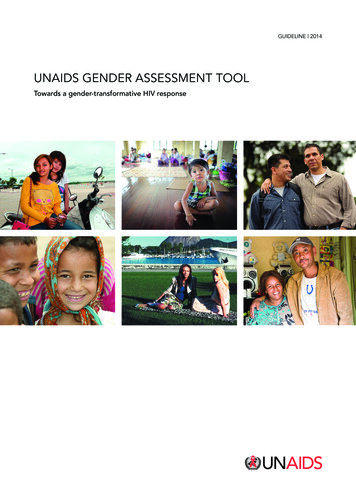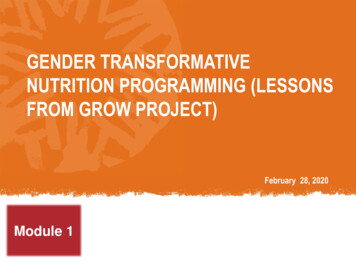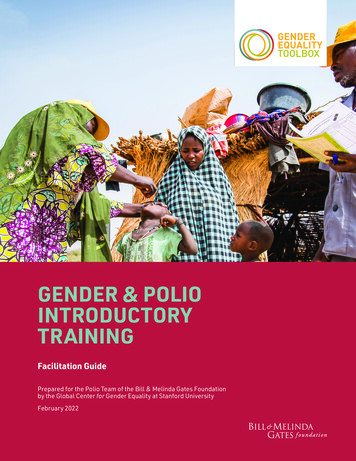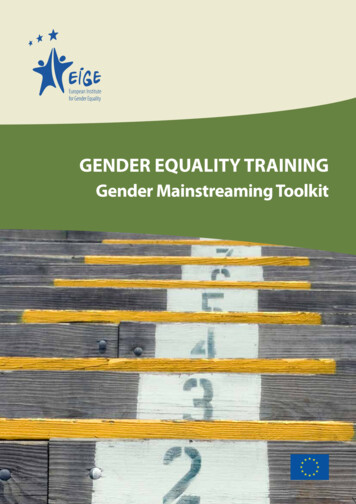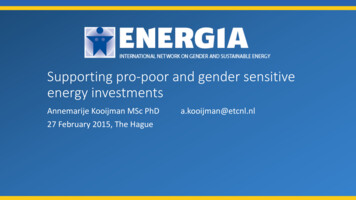
Transcription
Supporting pro-poor and gender sensitiveenergy investmentsAnnemarije Kooijman MSc PhD27 February 2015, The Haguea.kooijman@etcnl.nl
OutlineENERGIA’s activities in supporting pro-poor and gender-responsiveinvestments at the field level.Gender mainstreamingWomen’s economic empowermentSharing lessons learned from gender approaches in the energy sector
ENERGIA: International network on genderand sustainable energy Since 1996creating aninstitutionalbase for mainstreaminggender into the energysectorin developing countries Members in 22 countries Current program in 13countries in Africa andAsia Hosted by ETC Foundation, Netherlands
ENERGIA Commited to SE4ALLMember of Advisory Board
ENERGIA’s Goals and Programme InterventionsWomen’s Economic Empowerment ProgrammeGender and Energy Research ProgrammeAdvocacy & Policy Influencing ProgrammeGENDER MAINSTREAMINGGoal: That women and men have equal and equitable access to and controlover sustainable energy services as an essential right to development
Rationale for gender mainstreaming Attention to gender issues in energy projects can improvedevelopment effectiveness and improve project efficiency In practice, few mainstream energy projects mainstream gendersystematicallySince 2007, ENERGIA has been assisting 19 energy (and environment)projects to mainstream gender to showcase: how gender-specific impacts can be generated through energyaccess projects and markets; how mainstreaming gender can improve energy project outcomes; how such impacts can be multiplied.
ENERGIA-Assisted ProjectsCountryOrganizationEnergy Intervention Geographical scopePakistanRSPNPakistan DomesticBiogas ProgramNationwideBurkina Faso, Ethiopia,Kenya, Senegal, Tanzaniaand UgandaHivos/SNV/DGISAfrica BiogasPartnershipProgrammeNationwide in 6countriesNepalGovernment ofNepal/SNVBiogas SectorProgrammeNationwideKenyaSCODEImproved cook stovesRift Valley & CentralProvinces
BotswanaBotswana PowerCorporationRural Electrification (grid and off-grid)NationwideSenegalPERACOD/ENDARural electrification and domesticenergy supplyKaolack & CasamanceTanzaniaTaTEDOMulti-functional platforms/Productive Northern regionUse ContainersNepalREDPCommunity managed micro hydroAll districtsPhilippinesSIBATCommunity-based Ruralelectrification (PV, micro-hydro, wind)14 projects,community levelKenyaKenya Power andLighting CompanyElectricity UtilityNationwideSri LankaPractical ActionLiquid biofuels & micro-hydroTwo districts
Gender mainstreaming approach in practiceAssess the contextAssessOrganizationalCapacityAgree on GenderGoalDecide GenderSpecific ActivitiesTrack ProgressAssess GenderSituation on theGroundPREPARE:Background review,organizationalassessment, consultingwith project communityDESIGN:Gender Action Plan,including goal, expectedoutcomes, activities andM&E frameworkIMPLEMENT:Institutionalize theprocess (org. policies,staffing, capacitybuilding, documentation)MONITOR:FeedbackTrack progress, outcomesand communicate
Mainstreaming gender within project cycle: An exampleStrategies and ActionsFeasibility study Additional training (technology/confidence/ leadership) Other enabling conditions Role and status of women insimilar trades/ allied business Assess overall potentialEconomicEmpowermentWomen form x% ofservice providersBaseline study Assess women’s potential (literacy/numeracy skills/ business acumen) Capacity building and other needs Perception of men Women’s institutionsMonitor Number of women serviceproviders after . Years ofproject Average increase in income
Gender mainstreaming actions: different problems lead to different solutionsBPC (Botswana PowerCorporation)Ruralelectrification (onand off grid) BPC Conditions of Service aligned with nationalgender obligations Develop a gender mainstreaming policy for BPC andreview the BPC CSR policy Engender planning by including genderdisaggregated information on connection rates andobstacles to connectionSCODE (SustainableCommunityDevelopmentServices), KenyaImprovedcookstoves Engender terms of reference of staff Leadership and business development programmesfor women entrepreneurs Introduce a women-friendly potter’s wheelRSPN (Rural SupportProgramme Network)PakistanNational domesticbiogas programme Recruit women Social Organizers Training for women (veterinary care, kitchengardening, plant maintenance) Engender promotional material Gender indicators in biogas user surveysSIBAt , (Sibol ngCommunity basedAgham at Teknolohiya) rural electrification(PV, micro hydro,wind) Develop gender sensitive technology standards Incorporate gender concerns within existinginstruments such feasibility studies, communitytraining and impact evaluation.
Experience in Botswana: BPC (Botswana Power Corporation) Starting point: 52 % of all rural householdsare female-headed yet they connect to thegrid at only half the rate of male-headedhouseholds Outcomes: review the marketing strategies to also targetwomen review products of BPC Result: Prepaid system: Ready boxPhoto: B.P.C., Botswana
Good practice and lessons learned from ENERGIA’s experience in gendermainstreaming Commitment and felt need from organisation to include gender is crucialLocal ownershipUse a flexible/ adaptable approach to gender mainstreamingIntegrate gender mainstreaming within the entire project cycle: Integration ofgender baselines, indicators, and disaggregation into existing frameworksThe project must lead the GM processPeg expectations realistically: Realizing impact is a long-term goalWork as a team (organisation, local gender expert, ENERGIA)Bring in methodology and experiences (other countries, other sectors)Follow-up and monitoring based on targets and results
Women’s Economic EmpowermentInclusivebusinessmakingmarketswork forwomenempoweringwomen tocompete inmarketsWhat isWEE?Investing in women’seconomic empowermentsets a direct pathtowards gender equality,poverty eradicationand inclusive economicgrowth(UN Women)
Energy – Women’s Economic Empowerment NexusUniversal energy accessDouble the global rate ofimprovement in energyefficiencyEE to reduce costs &increase profits in womenenterprisesWomen’s productive activitiesin high impact value chainsLabour-saving technology toincrease productivity ofwomen’s labourDouble the RE share inglobal energy mixWomen’s employment andenterprises selling goods andservices in RE value chain
Key Entry Points & Strategies toENERGIA’s WE ApproachEmployment &EntrepreneurshipSupply Chains& FinancingCapacity &SkillsDemand &UptakeCommunication,Information &MonitoringFocus onsectors / valuechains wherewomendominateDesignfinancingmechanismswith a genderfocusPrioritizewomen intechnical/BDStrainingUse womencommunicationchannels forconsumersensitization &educationMonitoragainst targets& KPIs at alllevelswomen formanagement& leadershipFocusmessage onaspiration,economics &quality ofserviceDocument theevidence baseon supply &demand side &link to SE4ALLoutreachSupport ed atwomenInvolve WEs inmonitoring &communicationsLeverage/scaleup provenbusinessmodelsSupportexisting WEs& women asown bossesAnalyzemarkets &distributionchains withWEEopportunitiesin mindBuild aninclusivevalue chainTrain
Focus countries, partners and target forENERGIA’s WE programmePartnerCountryNo. of consumersTechnologiesKenyaNo. of womenentrepreneurs730Practical ActionSCODE364,200ICS, briquettes, solarKopernikIndonesia600250000GVEPSEM FundSolar SisterSenegal250400,000ICS, solar power, waterpurifiers.Solar, briquettes, 00ICS, productive useenterprises33802,068,200CRTNNACEUNPACTotal
Good practice and lessons learned from ENERGIA’s experience inWomens’ Economic Empowerment High impact occupations: in which women have a strong role Women have a natural affinity for networking at the community levelfor customers and for support among entrepeneurs Potential pitfall: local entrepreneurs invest both financial and socialassets- and therefore also carry a high risk Advocacy and support to include gender in the institutionalframework In national budgets, a minimum budget to be set for renewableenergy initiatives for women
Key messages from ENERGIA’s experience in gender mainstreaming andwomen’s economic empowerment Demand drivenInclusive and local context and ownershipLink to /integrate gender approach into policy and existing frameworksDemystify gender: translate into concrete outputs and monitoring
THANK YOU
In practice, few mainstream energy projects mainstream gender systematically Since 2007, ENERGIA has been assisting 19 energy (and environment) projects to mainstream gender to showcase: how gender-specific impacts can be generated through energy access projects and markets; how mainstreaming gender can improve energy project outcomes;
